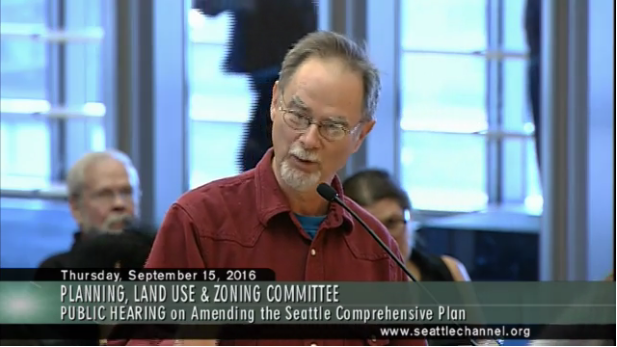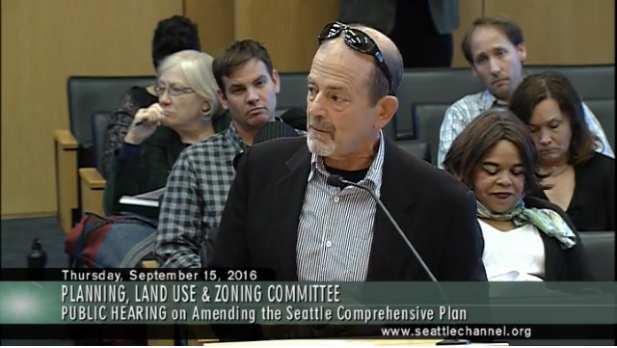At Thursday’s Planning, Land Use, and Zoning (PLUZ) Committee, dozens of residents commented on the Seattle 2035 Comprehensive Plan and the amendments being considered. Some commenters called on the City to slow down the process, seeming to hope to delay zoning changes. Others encouraged the City to speed up to set fully in motion the City’s Mandatory Housing Affordability-Residential (MHA-R) program that would link affordability requirements to increased development capacity.
Councilmember and PLUZ Chair Rob Johnson closed public comment, and noted, “There is a point where the Seattle process needs to conclude.” He cited the long process that had already taken place including at least five Seattle 2035 Comprehensive Plan presentations at the PLUZ committee and eight more in other council committees.
Johnson said he plans to put the Comprehensive Plan amendments to a vote at the next PLUZ Committee meeting on September 20th. He said the full City Council will likely take up the Comp Plan at its October 3rd meeting.
More On The Comprehensive Plan
For more background, The Urbanist has offered extensive Comp Plan coverage and analysis.
- Future Land Use Map (FLUM)
- Key policy amendments
- Draft Environmental Impact Statement (DEIS)
- Seven takeaways from Mayor’s Recommend Plan
- PLUZ Committee guidance on amendments
Busy Beavers

Some opponents of the Comprehensive Plan resorted to colorful metaphors at Thursday’s meeting to get their points across or at least dress up the same talking points. None more so than David Ward who made an extended beaver metaphor to paint a portrait of bureaucratic morass and developer greed. I’ve included his comment below because many opponents made the same points but none in as much style:
I’m a volunteer driver for parks and today I did a naturalist tour and the focus actually was on beavers. I thought beavers that’s just like what’s happening with the Comprehensive Plan. The City’s been busy as beavers making insurmountable mounds of detailed changes in the Comprehensive Plan, and the public can’t follow those change. A lot of them are coming at them last minute. There’s not much we can do. So I ask that you delay the Comp Plan until the end of December or early January 2017. The neighborhoods are trying to keep up with what’s happening in their neighborhoods and their neighborhood plans, but the developer beavers keep building so much that they’re destroying the plans that were established before. I ask that the Comp Plan restore the strong neighborhood plans that were in there before and should continue in the future. The busy beavers are building so much that there’s also no chance for concurrency. We really need that for the livability in our neighborhoods, for the schools, for the roads, for the other facilities. And just like beavers, the developers are not paying impact fees. And just like beavers, the Comp Plan… I can’t see what I’ve written here. But anyway the public needs to have delays on the Comp Plan. We need to return to having strong neighborhood plans. You know how we have all these signs in the neighborhoods that say ’20 is plenty’? There are 200 changes in the Comp Plan. So, that’s ten times as much. 20 changes is sufficient.”
Councilmember Johnson parried “As a big tooth person, you’re not the first person to call me a beaver, but I appreciate that.”
Vocal Support For Municipal Broadband
A handful people spoke in support of Policy 92 that would add municipal broadband internet to the Comprehensive Plan. Commenters argued City-provided internet could offer faster service at lower prices and break the stranglehold that Comcast and CenturyLink have on the city.
Back in March, Mayor Ed Murray distanced himself from municipal broadband instead paying lip service to that politico obsession: public-private partnership. A City-commissioned study released in summer 2015 showed it would cost between $480 million and $665 million to build out a municipal-broadband network across the city. “That price tag is less than previously estimated, but the mayor said it was still too much to be feasible,” Rachel Lerman reported.
“When I came into office, I was very excited about the possibility of municipal broadband until the study came back and indicated it would be literally the largest tax increase in Seattle,” Murray said.
It’s unclear how a half-a-billion-dollar program would somehow break the budget in a city that recently OK’d a $930 million transportation levy, a $290 million housing levy, a $371 million seawall, very nearly a $149 million police precinct Mayor Murray himself championed, and statewide multi-billion dollar projects like the SR-99 Bertha tunnel and the new SR-520 bridge. Mayor Murray’s fiscal conservatism on municipal internet is penny wise but pound foolish when considering the pronounced competitive advantage it would give Seattle’s booming tech sector.
Putting municipal broadband in the Comprehensive Plan would pressure Mayor Murray to make this a reality or at least unveil the details of his brilliant private-public partnership plan.
Video of Thursday’s PLUZ Committee meeting is available here.
Doug Trumm is publisher of The Urbanist. An Urbanist writer since 2015, he dreams of pedestrian streets, bus lanes, and a mass-timber building spree to end our housing crisis. He graduated from the Evans School of Public Policy and Governance at the University of Washington in 2019. He lives in Seattle's Fremont neighborhood and loves to explore the city by foot and by bike.


